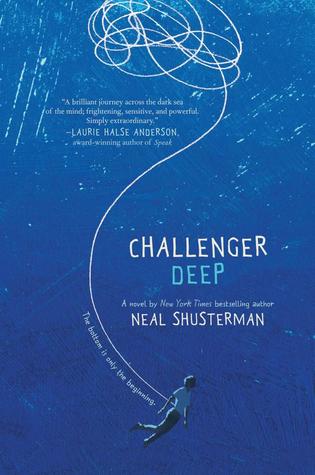
Challenger Deep
By Neal Shusterman
Expected publication April 21, 2015 by Harper Teen
Caden is sailing on a ship and trying to decide if his allegiance lies with the captain or with the parrot, knowing that his decision will have irreversible consequences. Caden is also attacking strangely enough that his parents start to notice, that his friends slowly pull away. Which is Caden's real life? Will he ever be able to tell the difference?
I was really looking forward to reading this one. I've read Shusterman's Unwind Dystology and really enjoyed it and I've been meaning to read his other work. When I spotted his newest book available on Edelweiss, I eagerly downloaded it and couldn't wait to dive in.
This book is quite clearly very different from Shusterman's other novels. Most of Shusterman's previous work is speculative fiction. This book, while it has some seemingly speculative elements, is very much a realistic contemporary novel. While it's true that most of what I read is speculative fiction, I still greatly anticipated this novel. I think Shusterman's writing is fantastic and I was interested to see his skill telling a story about a teen with mental illness.
I was not wrong to anticipate this book. It is excellent. It is heartbreaking and anxiety-inducing and complicated and a little bit hopeful. As expected, Shusterman's writing is quite good, if a bit different from the previous novels I've read. This story is split into two parallel narratives: one of Caden's life with his family and friends and another of Caden's life as a crewman aboard a ship. Shusterman does an excellent job of highlighting the similarities between these two lives, showing how difficult it is for Caden to understand which one is real. It is heartbreaking and haunting to read this book - it opens your eyes to what life is like for people who struggle with mental illness. You so desperately hope for Caden to understand his illness and find a way through, but at the same time, you can see how difficult such a thing will be. I appreciated that Shusterman doesn't given Caden a specific diagnosis and that he acknowledges how complex they are to understand (with similar symptoms, different cases presenting differently, etc.). I think it highlights how little we know about mental illness and how alarming it is that we don't talk about it more. I was a bit sad that Shusterman mostly mentions medications as numbing agents - this is a dangerous narrative in our society, one that often leads to people not seeking treatment, and I was disappointed that Shusterman employed it here. There is a section of the book that takes place after Caden stops taking his medication and then begins again, showing how difficult it was for him to function without the medication, but this piece seems to pale in comparison to the more prevalent discussions of drugs as numbness.
I appreciated that Caden's parents had a presence in the novel, albeit not a large one. It was difficult to see them a bit reluctant to realize that something was different about their son, but it also felt realistic. Because we don't talk about mental illness often in our society, many families have a hard time accepting that it could happen in their own - in fact, it's pretty likely. I liked that Caden's parents continued to have a presence even after his admittance to the hospital - I feel like the typical scenario would have focused solely on Caden and the other patients. Other patients are discussed, but this is still mostly Caden's story. I actually found the piece with Calliope to be a bit superfluous - I though the story with Hal was much stronger.
Really, I thought about just copying down what I think is the most important quote from the book and having that be my entire review. "Dead kids are put on pedestals, but mentally ill kids get hidden under the rug." That one sentence says so much more than I really can about how important this book and others like it are for not just for teens but for our society as a whole. We really need to bring mental illness out of the dark and talk about it for what it is: an illness. One that can be difficult to diagnose and even harder to cure, but certainly one that can be treated and supported.
Ultimately, this is a difficult but important book, one that I hope will start a conversation about how we can better support kids with mental illness. I'm grateful to Shusterman for writing this book.
Thanks to the publisher for a digital advance reader's copy, provided via Edelweiss.
No comments:
Post a Comment